
Brothers :
The Holy Spirit
and Jesus
| Next | Previous | Index | Tellout Home |
16. Human Child Jesus
Strong Emotions
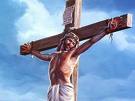 We know precious little about the childhood of Jesus from the Scriptures. In his life, we find a full range of strong emotions. Seeing people in their need moves Jesus profoundly. Matthew 9.36 describes Jesus' feelings, "when he saw the crowds, he had compassion for them, because of their harassment and helplessness, like sheep without a shepherd." He becomes hungry in the wilderness after an extended period without any food. At the time of the Temptation in Matthew 4.2, we are told, " After fasting forty days and forty nights, he was hungry."✞
We know precious little about the childhood of Jesus from the Scriptures. In his life, we find a full range of strong emotions. Seeing people in their need moves Jesus profoundly. Matthew 9.36 describes Jesus' feelings, "when he saw the crowds, he had compassion for them, because of their harassment and helplessness, like sheep without a shepherd." He becomes hungry in the wilderness after an extended period without any food. At the time of the Temptation in Matthew 4.2, we are told, " After fasting forty days and forty nights, he was hungry."✞
Shows Deep Feelings
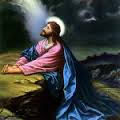 On the cross, Jesus cries out in John 19.28 because his thirst is so great. "Later, knowing that he had now been finished everything, and that Scripture was now fulfilled, Jesus says, 'I am thirsty.'" Jesus exhibits other human characteristics and suffers immensely on the cross. Luke 22.44 explains that while praying in the Garden of Gethsemane, "being in anguish, he prayed more earnestly, and his sweat was like drops of blood falling to the ground." Many people believe this indicates a rare clinical phenomenon of sweating blood called "hematohidrosis" or "hematidrosis" from the two Greek words for "blood" and "sweat." Leonardo Da Vinci (1452-1519), a famous Italian artist, scientist, and writer, describes a soldier who sweated blood before battle. Christ is in extreme human agony and is not immune to pain.✞
On the cross, Jesus cries out in John 19.28 because his thirst is so great. "Later, knowing that he had now been finished everything, and that Scripture was now fulfilled, Jesus says, 'I am thirsty.'" Jesus exhibits other human characteristics and suffers immensely on the cross. Luke 22.44 explains that while praying in the Garden of Gethsemane, "being in anguish, he prayed more earnestly, and his sweat was like drops of blood falling to the ground." Many people believe this indicates a rare clinical phenomenon of sweating blood called "hematohidrosis" or "hematidrosis" from the two Greek words for "blood" and "sweat." Leonardo Da Vinci (1452-1519), a famous Italian artist, scientist, and writer, describes a soldier who sweated blood before battle. Christ is in extreme human agony and is not immune to pain.✞
Growing Child
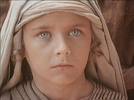 Like any other youngster, Jesus grows up and develops physically and mentally. Luke 2.40 tells us, "And the child grew and became strong; God filled him with wisdom, and his grace was on him." Again Luke 2.52 records, "Jesus grew in wisdom and stature, and favor with God and man." But even as a child, Jesus is aware of his destiny.✞
Like any other youngster, Jesus grows up and develops physically and mentally. Luke 2.40 tells us, "And the child grew and became strong; God filled him with wisdom, and his grace was on him." Again Luke 2.52 records, "Jesus grew in wisdom and stature, and favor with God and man." But even as a child, Jesus is aware of his destiny.✞
Astonished by Jesus
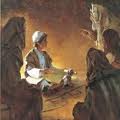 On one occasion, Jesus wandered away from his parents to listen to the Temple's holy men. "When his parents saw him, they were astonished." His mother says to him in Luke 2.48, " 'Son, why have you treated us like this? Your father and I have been anxiously searching for you.'" Mary and Joseph naturally show great concern for Jesus' well-being.✞
On one occasion, Jesus wandered away from his parents to listen to the Temple's holy men. "When his parents saw him, they were astonished." His mother says to him in Luke 2.48, " 'Son, why have you treated us like this? Your father and I have been anxiously searching for you.'" Mary and Joseph naturally show great concern for Jesus' well-being.✞
Human Jesus Christ
 The human Jesus Christ is indeed holy and divine, like the Father and the Holy Spirit. To emphasize Jesus' humanity as "the Word made flesh," Julian of Norwich (1342-1416 AD), who was an influential Christian mystic in the Medieval Church in England, addresses the human Jesus Christ as "my sister and my mother." These terms are unusual ones we do not normally associate with Jesus, the Son of God. Jesus Christ is described by the angel before his birth as "holy one" in Luke 1.35, where "The angel answered, “The Holy Spirit will come on you, and the Highest power will overshadow you. So the holy one to be born will be called God's Son." Jesus lives without sin and is not impacted by evil nor by "this world's ruler." In John 14.30, Jesus, therefore, says, "I will not say much more to you, for the prince of this world is coming. He has no hold over me."✞
The human Jesus Christ is indeed holy and divine, like the Father and the Holy Spirit. To emphasize Jesus' humanity as "the Word made flesh," Julian of Norwich (1342-1416 AD), who was an influential Christian mystic in the Medieval Church in England, addresses the human Jesus Christ as "my sister and my mother." These terms are unusual ones we do not normally associate with Jesus, the Son of God. Jesus Christ is described by the angel before his birth as "holy one" in Luke 1.35, where "The angel answered, “The Holy Spirit will come on you, and the Highest power will overshadow you. So the holy one to be born will be called God's Son." Jesus lives without sin and is not impacted by evil nor by "this world's ruler." In John 14.30, Jesus, therefore, says, "I will not say much more to you, for the prince of this world is coming. He has no hold over me."✞
The Way
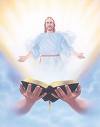 Because Jesus is both human and holy, he claims to be "the Way." He offers himself as a perfect example for people to follow. In John 14.6, Jesus makes it quite clear, "I am the way and the truth and the life. No one comes to the Father except through me." By embodying purity, he also authenticates his claim to be the truth. Because Jesus is pure and genuinely the holy God, he deserves our worship. Saint Paul explains in Colossians 1.15, "The Son is the image of the invisible God, the firstborn over all creation." Philippians 2.11 adds, "Therefore God exalted him to the highest place and gave him the name that is above every name. At Jesus' name, every knee should bow, in heaven and on earth and under the earth. And every tongue acknowledges that Jesus Christ is Lord, to the glory of God the Father." The deity of Jesus is also self-authenticating. H. P. Lidden (1829-1890 AD) in "The Divinity of our Lord and Savior," pages 234-5 writes, "The three aspects of the divine nature, denoted by the terms 'Life, Love and Light' are attributed in Saint John's writings explicitly to the Word made flesh. The Light, the Love and the Life are the Word Incarnate's glories which his disciples beheld, pouring its rays through the veil of his human tabernacle."✞
Because Jesus is both human and holy, he claims to be "the Way." He offers himself as a perfect example for people to follow. In John 14.6, Jesus makes it quite clear, "I am the way and the truth and the life. No one comes to the Father except through me." By embodying purity, he also authenticates his claim to be the truth. Because Jesus is pure and genuinely the holy God, he deserves our worship. Saint Paul explains in Colossians 1.15, "The Son is the image of the invisible God, the firstborn over all creation." Philippians 2.11 adds, "Therefore God exalted him to the highest place and gave him the name that is above every name. At Jesus' name, every knee should bow, in heaven and on earth and under the earth. And every tongue acknowledges that Jesus Christ is Lord, to the glory of God the Father." The deity of Jesus is also self-authenticating. H. P. Lidden (1829-1890 AD) in "The Divinity of our Lord and Savior," pages 234-5 writes, "The three aspects of the divine nature, denoted by the terms 'Life, Love and Light' are attributed in Saint John's writings explicitly to the Word made flesh. The Light, the Love and the Life are the Word Incarnate's glories which his disciples beheld, pouring its rays through the veil of his human tabernacle."✞
"Human Child Jesus"
by Ron Meacock © 2021
| Top Page | Next | Previous |